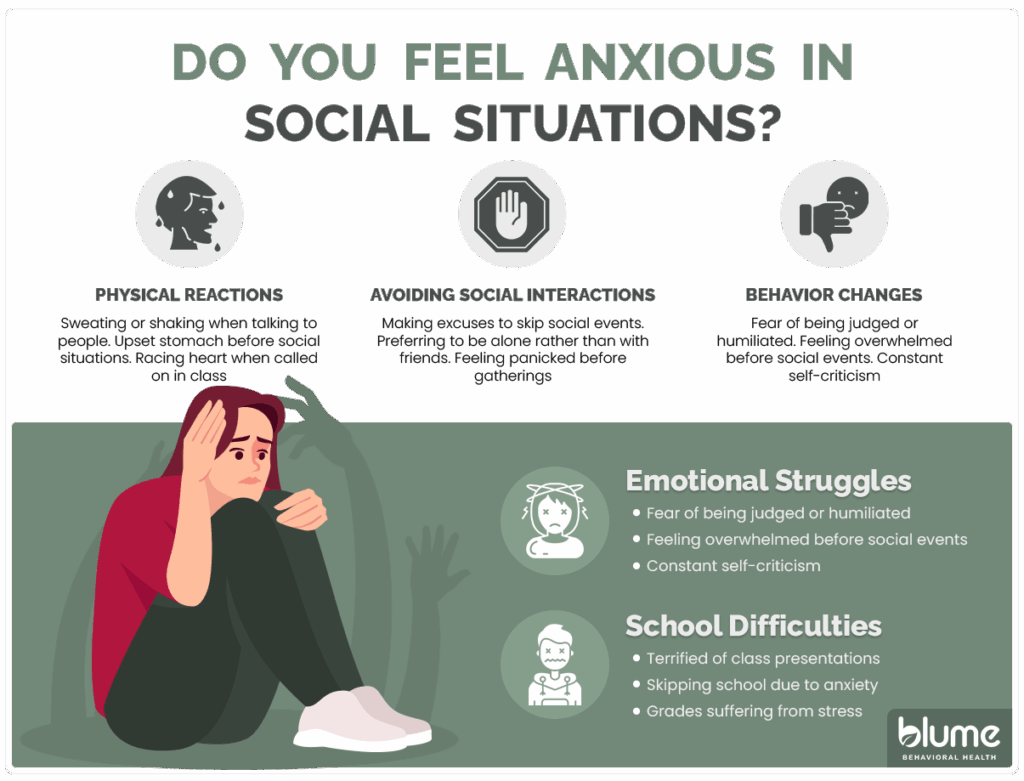
Understanding what our teens are going through emotionally can be a tough challenge for parents, caregivers, and even educators. One issue that’s increasingly prevalent is social anxiety. But how do you recognize the signs of social anxiety in teens? Luckily, Blume is here to help you explore five key indicators you should be aware of.
Before diving into the symptoms, it’s crucial to understand what social anxiety is. Social anxiety disorder, also known as social phobia, is more than just shyness or occasional nerves. It is a mental health condition characterized by intense, excessive, and prolonged worry and fear about social situations. For teens, this could mean extreme stress over everyday activities like going to school, talking in class, or even attending social gatherings.

The first and perhaps most evident sign is an avoidance of social situations.
A teen might make up excuses to avoid parties, gatherings, or even school activities.
They may prefer spending time alone rather than with friends or family.
You may notice a decline in social engagements, or your teen may stop participating in activities they once enjoyed.
Social anxiety often manifests itself in physical symptoms that are hard to ignore.
Excessive sweating, especially in social settings, can be a sign.
This could happen before or during social interactions.
Some teens experience digestive problems when anxious
Watch out for signs of emotional distress directly linked to social interactions.
This might occur before or after social events.
Your teen might express a dread of upcoming social situations.
Many teens with social anxiety battle with feelings of inadequacy.
Behavioral changes are common indicators that should not be overlooked.
Your teen may rehearse conversations in advance, worried about how they will be perceived.
Look for signs like crossed arms, lack of eye contact, or hunched shoulders.
Social anxiety can lead to rumination, where the teen keeps replaying social interactions in their head, dwelling on what went wrong.
Academic struggles related to social anxiety can often be a red flag.
A fear of speaking up in class or giving presentations.
Frequent absences from school might be linked to social anxiety.
Academic performance can suffer when a teen is preoccupied with social anxiety.
Identifying the signs of social anxiety in teens early on can make a significant difference. The sooner you recognize these signs, the quicker you can seek professional help. At Blume, we offer a comprehensive treatment approach for adolescents grappling with social anxiety, among other mental health issues. Don’t wait; early intervention can be life-changing.
Do you recognize these symptoms in your teen? Contact us today to learn how Blume can assist your family in navigating this challenging condition.
A personality trait often characterized by discomfort in new social situations but doesn’t necessarily disrupt daily life.
A mental health disorder with symptoms that can interfere significantly with daily activities and relationships. It involves intense, excessive fear or worry about social situations.
While social anxiety may not be entirely “cured,” it can be effectively managed with proper treatment. Various therapies and medications have shown promise in reducing symptoms and improving quality of life.
Diagnosis generally involves a comprehensive evaluation by a qualified mental health professional. This typically includes clinical interviews, self-report questionnaires, and sometimes feedback from teachers or caregivers.
Parents can play a crucial role in helping their teens manage social anxiety. Key steps include:
Encourage your teen to talk openly about their feelings.
Early intervention can make a significant difference.
Attend therapy sessions with your teen if possible, and engage in recommended at-home practices.
If you recognize the signs of social anxiety in your teen and are looking for professional help, Visit our Contact Us page for a confidential discussion on how Blume can assist your family.
Dr. Aneta Lotakov Prince is a board-certified psychiatrist with over 20 years of clinical experience treating adolescents and adults facing severe mental illness, co-occurring substance use disorders, and complex emotional and behavioral health challenges. Certified by the American Board of Psychiatry and Neurology, she holds an active DEA registration and California medical license. Dr. Prince’s patient-centered approach is rooted in compassion and driven by a dedication to improving quality of life and supporting long-term recovery. She remains deeply committed to empowering each individual she works with to build a life of purpose, connection, and resilience.